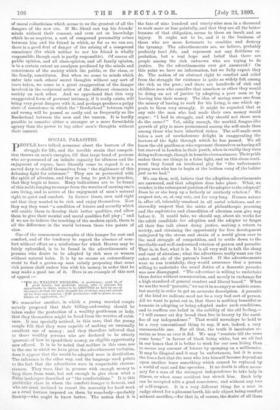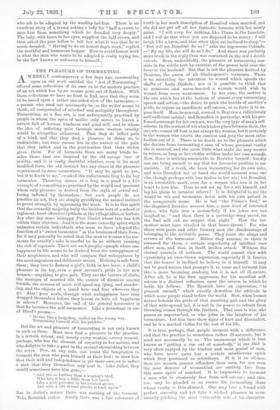SOCIAL PARASITES.
PEOPLE have talked .nonsense about the horrors of the struggle for life, and the terrible strain that competi- tion throws on men's energies, till that large band of persons who are possessed of an infinite capacity for idleness and the enjoyment of repose, have literally come to regard it as a sacred duty to shield themselves from "the nightmare of this debasing fight for existence." They are so permeated with the spirit of altruism, and they so long to put it in practice, that they begin at home. Many indications are to be found of this noble longing to escape from the worries of earning one's own living, and to arrive at the enjoyment of man's natural right to quiet and comfort. In former times, men said right out that they wanted to be rich and enjoy themselves. Now they say they want "a condition of leisure and security which will enable them to develop their better qualities, and allow them to give their mental and moral qualities full play ; " and if we are to believe the teaching of the modern spirit, there is all the difference in the world between these two points of view.
One of the commonest examples of this hunger for rest and comfort, and of the tendency to regard the absence of com- fort without effort as a misfortune for which Heaven may be fairly upbraided, is to be found in the advertisements of persons who desire to be adopted by rich men or women without natural heirs. It is by no means an extraordinary event to find a grown-up man calmly proposing that some rich person shall endow him with his money, in order that he may make a good use of it. Here is an example of this sort of appeal :— " mo the WEALTHY HEIRLESS.-1 gentleman, aged 30, of good family, but moderate moans, who is anxious for opportunity to study, wishes to be ADOPTED as heir by one of the above, so that the mere struggle for existence may not absorb all his time and onergies.—Full particulars will be given in con. fidenco on application, &e."
We remember another, in which a young married couple naively proposed that their billing-and-cooing should be taken under the protection of a wealthy gentleman or lady, that they themselves might be freed from the worries of exist- ence. It was specially noticed, in this case, that the young couple felt that they were capable of making an unusually excellent use of money ; and they therefore inferred that to those wealthy persons who are declared to be utterly ignorant of how to spend their money, an eligible opportunity now offered. It is to be noted that neither in this case, nor in the one in which we have given the advertisement verbatim, does it appear that the would-be-adopted were in destitution. The inference is the other way, and the language used points to the fact that the advertisers were in respectable circum- stances. They Were, that is, persons with enough money to keep them from want, but not enough to give them what a Swiss innkeeper described as "the comfortations." It is this particular class in whom the comfort-hunger is fiercest, and who are most inclined to resent the necessity for hard work as a cruel torture imposed on them by somebody—probably Society—who ought to know better. The notion that it is the fate of nine hundred and ninety-nine men in a thousand to work more or less painfully, and that they are all the better because of that obligation, seems to them an insult and an injury. It ought not to be, and it is the business of those who are more fortunate to combine and destroy the tyranny. The advertisements are, we believe, probably perfectly bond fide, and represent not any fictitious ex- pectation, but a real hope and belief that there are people among the rich unknown who are trying to do justice. Do the advertisements ever get answered P On this point we have no information, but we fully expect they do. The notion of an abstract right to comfort and relief from the struggle for existence is quite as widely felt among the rich as the poor; and there are hundreds of rich and elaildless men who consider that somehow or other they would be doing an act of justice by adopting a poor man or by leaving him their money. The idea of saving some one from the misery of having to work for his living, is one which ap- peals to them very strongly. It might be expected that at any rate the men who had made their own money would argue: "I had to struggle, and why should not these men do the same P " Yet, oddly enough, the morbid, fungus-like growth of pity is more pronounced among the self-made than among those who have inherited riches. The self-made man takes a sort of unwholesome delight in exaggerating the horrors of the fight through which he has passed. We all know the old gentlemen who represent themselves as having all but starved in London in their youth, when in reality they were doing well enough, though in humble circumstances. Their pride makes them see things in a false light, and on this sham senti- ment they found an irrational pity for "the unfortunate young man who has to begin at the bottom rung of the ladder just as we had."
We can then, well, believe that the adoption-advertisements are answered, and that adoption does take place. What, we wonder, is the subsequent position of the adopter to the adopted? Does he or she keep up a fatherly or motherly relation P We suspect not, or, at any rate, not for very long. Human nature is, after all, tolerably constant in all social relations, and we shrewdly suspect that the mists of philanthropic yearning and the sophistries and absurdities of altruism soon give way before it. It would take, we should say, about six weeks for the adult candidate for adoption and the adopter to forget all their fine talk about doing justice, making a return to society, and obtaining the opportunity for free development uninjured by the stress and strain of a world given over to the mad struggle of competition, and to settle down to the inevitable and well-understood relation of patron and parasite. That is, in fact, what it is. It is all very well to talk the slang and cant of altruism ; what the advertisers really want are the cakes and ale of the patron's board. If the advertisements were to run truthfully, they would announce that a person willing to undertake the usual duties of a domestic parasite was now disengaged. "The advertiser is willing to undertake these duties without remuneration, and merely in exchange for a high standard of general comfort and liberal board." When we use the word "parasite," we use it in no angry or satiric sense, but merely in order to get an accurate description. A parasite of the kind we indicate need not be a very bad sort of person. All we want to point out is, that there is nothing beautiful or humane in adopting or being adopted under such conditions, and to reaffirm our belief in the nobility of the old feeling,— "I will sooner eat dry broad than live in luxury by the sacri- fice of my independence." That would nowadays be held to be a very conventional thing to say, if not, indeed, a very unreasonable one. For all that, the truth it inculcates re- mains as true as ever it did. We may "resolute till the cows come home" in favour of black being white, but we all feel in our bones that it is better to wOrk for our own living than to secure any amount of leisure by sponging on a millionaire. It may be illogical and it may be unfortunate, but it is none the less a faCt that the man who lets himself become dependent upon another loses something which cannot be replaced by a world of cant and fine speeches. It no doubt is often neces- sary for a man of the strongest independence to take help in illness, or when some accident has struck him. Such help can be accepted with a good conscience, and without any loss of self-respect. It is a very different thing for a man to cadge about for a pleasant berth, his sole object being comfort without sacrifice,—for that is, of course, the desire of all those -who ask to be adopted by the wealthy heirless. There is an excellent story of a tramp asking a lady for "half-a-crown to save him from something which he dreaded very deeply." The lady, with tears in her eyes, supplied the half-crown, and then asked the poor fellow to tell her what it was that he so much dreaded. "Having to do an honest day's work," replied the truthful and humorous beggar. How to avoid honest work is what the man who wants to be adopted is really trying for, be the fact known or unknown to himself.



































 Previous page
Previous page